Garden Products Recycling Business Plan
Hair Recycling Technologies (HRT) will collect, sanitize, and market human hair as a consumer good. Our recycled hair products target home gardeners, benefiting from hair’s elemental characteristics and human scent.
Consumers benefit from our products’ ability to promote healthy plant life and deter pests. HRT will manufacture three products: SMART SOIL hair fertilizer, HARE AWAY pest deterrent, and organic plant food for rose bushes.
Hair Recycling Technologies enters a niche market, introducing human hair for gardening. The founders believe this concept is unique and viable, tapping into an untapped, high-growth market. Exciting possibilities arise from its potential and innovative nature.
Investors will be paid back within one year, maintaining a positive cash position. The business is expected to break even in month nine of the first year.
Our research on human hair’s positive elemental characteristics and potential uses is well advanced. Initial results are positive, and we continue to explore further possibilities.
HRT plans to collaborate with the Horticulture Department at the University of Georgia to research and test human hair’s potential as a plant growth promoter. Local nurseries in the South Bend market also express strong interest in carrying our product.
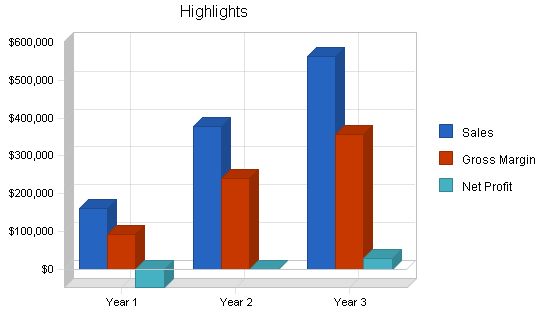
Hair clippings have long been a waste problem for barber shops and beauty salons. In metropolitan areas that handle large amounts of waste, human hair is often disposed in landfills. Recycling and composting of municipal solid waste have increased during the past decade. There were more than 9,000 curbside recycling programs in America in 1997, and 12,000 drop-off centers for recyclable material. The EPA’s target-recycling goal is 35 percent by 2005. This presents an opportunity to recycle hair and benefit from its positive properties.
Research has shown that human hair contains a high nutrient value which, when mixed with potting soil, produces a higher quality plant food and soil enhancer than what is currently on the market.
Human hair, like wool and silk, has a high nitrogen content, which encourages tissue growth in the soil. If barber shop clippings were regularly applied to a compost heap, a significant amount of nitrogen could be recovered. Six to seven pounds of human hair contain approximately one pound of nitrogen, equivalent to 100 to 200 pounds of manure. Hair also disintegrates easily in a well-moistened compost heap.
Experiments with 32 varieties of roses indicate that human hair used around the roots produces longer stems, larger buds, and deeper color tones. Hair at the base of plants accelerates growth, though slowly, as it takes many months to decay.
Hair Recycling Technologies aims to provide consumers with a recyclable resource that benefits from human hair’s properties and organic elements. The company also hopes to promote a positive feeling about recycling and the environment.
The concept of recycling human hair for use as a plant food, soil enhancer, and animal deterrent is unique and innovative in the plant and gardening industry. Introducing this product to the marketplace will be successful due to its unique factor and the positive characteristics that human hair can provide to gardeners. The product will appeal to consumers not only because it is organic and in growing demand, but also because of its marketable benefits.
The legal name of the company will be Hair Recycling Technologies, Inc. It will be formed as a Sub-chapter S Corporation in the state of Delaware under the category "For Domestic Profit." The S-chapter Corporation will be advantageous due to its tax benefits and the founders’ incurred start-up costs. Delaware is chosen for incorporation due to its temperate legal requirements and pro-business environment.
A team of six talented individuals has been formed, consisting of the four original founders. The staff includes K. Justin Luber as President and CEO, Jason Mysliwec as Vice-president of operations/finance, Hunter Korth as the financial advisor, and Robin Liu as the marketing advisor.
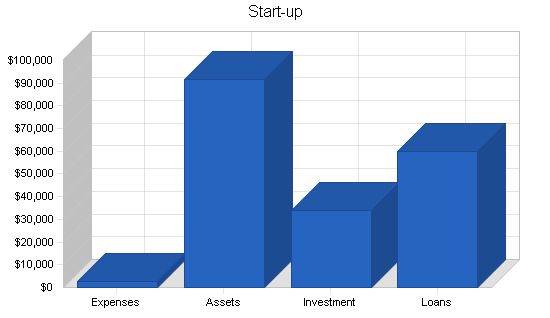
Start-up Funding
Start-up Expenses to Fund: $2,550
Start-up Assets to Fund: $91,450
Total Funding Required: $94,000
Assets
Non-cash Assets from Start-up: $14,829
Cash Requirements from Start-up: $76,621
Additional Cash Raised: $0
Cash Balance on Starting Date: $76,621
Total Assets: $91,450
Liabilities and Capital
Liabilities
Current Borrowing: $0
Long-term Liabilities: $60,000
Accounts Payable (Outstanding Bills): $0
Other Current Liabilities (interest-free): $0
Total Liabilities: $60,000
Capital
Planned Investment
Investor 1: $10,000
Investor 2: $8,000
Investor 3: $16,000
Additional Investment Requirement: $0
Total Planned Investment: $34,000
Loss at Start-up (Start-up Expenses): ($2,550)
Total Capital: $31,450
Total Capital and Liabilities: $91,450
Total Funding: $94,000
Start-up
Requirements
Start-up Expenses
Legal: $200
Stationery etc.: $150
Brochures: $200
Insurance: $200
Rent: $600
Utilities: $200
Other: $1,000
Total Start-up Expenses: $2,550
Start-up Assets
Cash Required: $76,621
Start-up Inventory: $5,729
Other Current Assets: $0
Long-term Assets: $9,100
Total Assets: $91,450
Total Requirements: $94,000
2.2 Company Locations and Facilities
Hair Recycling Technologies will begin its initial operations in South Bend, IN. A suitable location has been obtained in the basement of one of the founders. When capacity is exhausted due to growth, the operations will be moved and based in a larger facility in South Bend, IN.
2.3 Government Regulations
Because Hair Recycling Technologies recycles a waste product and incorporates it into an environmental product, the company is under the potential jurisdiction of the Environmental Protection Agency. The manufacture and sale of human hair is not currently regulated or enforced by either federal or state authorities. According to the Environmental Protection Agency, there are “no current restrictions on human hair.” Currently since the sale of human hair does not fall under any federal or state law regulations, we will not need to file with the Environmental Protection Agency.
Hair Recycling Technologies will obtain all required federal and state permits and licenses to operate its facilities. There can be no assurance that HRT’s operation and profitability will not be subject to future restrictive regulations or increased taxation by federal, state, or local agencies.
Products
Hair Recycling Technologies will be the market leader as the first company of its type to collect, sanitize, and recycle human hair to be used as a plant food, a soil enhancer, and as an animal and pet deterrent. HRT realizes that consumers today are more conscious of recycling and of their environment. Because of this trend, consumers are moving away from traditional chemical based plant products to more natural organic plant materials.
3.1 Product Description
Hair is readily available at extremely low collection costs as the average major metropolitan area throws away approximately five tons monthly. A certain barbershop owner in Austin, TX illustrates: In one shop open five days per week, eight hours per day, employing three barbers, with 10 minutes waiting time between customers, the yield at 250 haircuts per week is approximately 2.5 lbs. per week or approximately 11 pounds per month (approximately 1,083 people).
In large metropolitan areas, if one half of the population receives a haircut each month, then one million people produce 10,000 lbs. of hair per month. One pound of hair per 100 lbs. of soil effectively feeds and maintains 33 potted plants equal to the size of a three feet tomato plant. Thus, 10,000 lbs. of hair should produce 1,000,000 lbs. of fertile nitrogen enriched soil, enough to support over 30,000 bushels of produce, all from one month’s collections of unused waste.
Hair Recycling Technologies will pick up the hair in the Midwest market and will take it to our facility for processing.
3.2 Sales Literature
Hair Recycling Technologies will aggressively enter the gardening market from South Bend, IN. We will begin by collecting the hair in the Midwest and will sell to Midwest nurseries and specialty stores. HRT will remain based in South Bend, IN until strong sustained growth allows us to penetrate the national market. We will then gradually move our operations to a larger facility in South Bend. Since the supply of hair is so critical to the success of our business, we will obtain contracts from our suppliers. In addition, HRT intends to work on a contract with the U.S. Army and other branches of the U.S. military to supply HRT with hair.
As our market share increases and growth allows, HRT will open facilities in other regions such as the Northwest, which is open to environmental products. As HRT grows, we will build on a national scale both collecting hair and distributing products nationwide. After HRT proves to be the market leader, maintaining sustainable growth, we will take advantage of free publicity since our products’ unique and innovative structures will attract many inquisitive parties.
Competitive Comparison
Hair Recycling Technologies is a company dedicated to the recycling concepts of our society and providing organic products, which completely satisfies our customers. All of our products will be composed of human hair that will be gathered from suppliers in the Midwest.
The hair we collect will be marketed in two basic forms. First, the hair will be sanitized and mixed with other organic elements to form a superior soil enhancer and plant food. Secondly, the hair will be packaged alone to be sold as an animal deterrent.
Our soil enhancer/plant food will consist of human hair, organic elements, and potting soil. What is a soil enhancer? A soil enhancer is an organic mixture that can be used in place of, or mixed with, the existing potting soil to increase the soil’s nitrogen content and enhance the nutrients present in the soil. Our enhancer is similar to fertilizers; however, it reacts differently from most fertilizers. Our enhancer is time released and will last over a long period of time, on average two to three months. The chemical reaction in present fertilizers takes place immediately and usually lasts no longer than three to four weeks. After three to four weeks, the customer must buy more fertilizer, costing both time and money.
Our animal deterrent consists of only sanitized hair. The strong human scent in hair is what keeps the animals away. Not only does it deter animals, but it has the benefit of adding nutrients for soil feeding. The customer simply places the hair around the vegetation and the work is done. Our soil enhancer can also be used as an animal deterrent. However, our separately packaged deterrent product will contain a strong mix of human hair and can be placed in strategic locations where it would face the animal head on.
4.1 Initial Product Line
HRT’s goal is to carry many products in its line. However, initially the company will introduce three specific products: SMART SOIL, HARE AWAY, and Rose Food.
4.1.1 Smart Soil
The first product will be a soil enhancer/plant food, which we will call SMART SOIL. The SMART SOIL name was chosen because the name describes our product and its advantages. SMART SOIL is a superior enhancer because the hair in our mixture slowly releases its nutrients over a longer period of time than other organic products currently on the market. All the consumer needs to do is spread the mix in with their plants and SMART SOIL goes to work. The product alleviates the hassle of constantly fertilizing the plants, so hence the name SMART SOIL.
The advantage of our product with respect to other organic soil enhancers currently on the market is that it uses an ingredient that is new and unique to the organic soil market. Human hair is 97% protein and contains 27 trace elements: The chemical constituents are as follows:
– Carbon: 50%
– Oxygen: 12%
– Nitrogen: 18%
– Hydrogen: 07%
– Sulfur: 04%
– Total: 100%
SMART SOIL will be an organic mix containing potting soil, recycled sanitized human hair, and other organic elements such as cottonseed meal and peat moss. SMART SOIL will be packaged in a plastic 3-pound bag.
SMART SOIL will be introduced as a soil enhancer and not as a fertilizer due to strict EPA restrictions. We feel that initially we can save money by labeling our product as a soil enhancer, thus avoiding an extra expense for lab work on our product. As the company and resources grow, we will introduce SMART SOIL as a fertilizer to compete in the fertilizer market and generate additional revenue.
4.1.2 Hare Away
The second product that HRT will carry is packaged recycled sanitized human hair. This product will be called HARE AWAY. It will be marketed specifically toward consumers who are having problems with animals such as deer and rabbits entering their garden. Because our simple sanitizing process will not eliminate the human smell contained on the hair follicle, HARE AWAY will be useful to deter animals and pests. The human hair in HARE AWAY will be chopped and shredded to very short lengths to improve its solvency as a nutrient, and make it more aesthetically pleasing to the buyer.
HARE AWAY will be sanitized and packaged in two different forms. First, it will be sold in a recycled, clear plastic bag containing a header label on the top describing the product and its beneficial uses. Secondly, the hair will be placed in a stocking type material and sold in plastic packaging. This product will be for consumers who desire to hang the stocking from a tree or post near or around the garden. This will allow consumers to strategically place our product in areas that will keep animals at a distance from their garden.
4.1.3 Rose Food
The third product HRT will introduce will be a rose food. As discussed earlier, HRT will reproduce the recipe by William Stafford of Austin, Texas, to market towards avid rose gardeners. The rose food will be introduced in three months from the start of operations.
Hair used alone will produce similar results, although at longer duration. Spread the hair around the surface as a mulch and water until it decays. Keep the hair on the surface since it is a good insulator for the roots of all tender plants in the severe cold.
William Stafford has many blue ribbons as proof it helps roses bloom longer in the winter.
Each of these products and all future products will be registered with the U.S. Trademark Department and will have the recycled label on the package to show the consumer that they are buying a recycled product. William Stafford’s hair recipe has no current copyrights or patents.
4.2 Future Products
Future products that HRT is looking forward to producing are the following:
– Chemical conversion of human hair to be used as a food additive.
– SMART SOIL fertilizer, similar to our soil enhancer however, marketed as a fertilizer containing additional organic elements.
– Plant spikes similar to what is currently on the market, but will be manufactured with our human hair formula.
– A gardening kit marketed toward the pre-teen gardener to help them gain a better appreciation for his/her environment.
– Resale of hair to wig manufacturers who use real hair for its wigs.
– Researching the benefits of using animal hair in future products.
Market Analysis Summary
Customers who will benefit from HRT’s products range from amateur plant lovers to professional gardeners. HRT will focus on two market segments in the local area.
Amateur plant lovers consist of hobbyists, houseplant enthusiasts, first-time gardeners, weekend gardeners, and other plant growers. HRT defines this group as amateurs because their goal is to grow plants for enjoyment or as an entertaining hobby and not for reasons of competition or profit.
Professional gardeners include those who grow plants to be judged in gardening competitions and those who are organic food growers in the organic produce market. Professional gardeners are very serious about their plant-growing methods because they are motivated by goals of winning competitions or earning profits.
These amateur and professional gardeners make up the general customer base of HRT. However, HRT has a more specifically targeted customer in mind. A significant number of these amateurs and professionals are members in one or more of the 150+ organic gardening clubs organized throughout the United States. HRT intends to target its customers as those who would use purely organic plant foods as an aid to their plant growing.
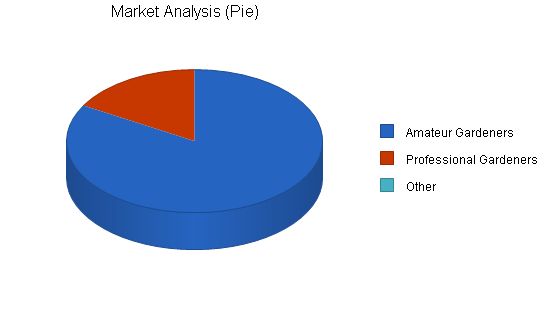
Market Analysis
| Market Analysis | |||||||
| Year 1 | Year 2 | Year 3 | Year 4 | Year 5 | |||
| 20,000,000 | 20,500,000 | 21,012,500 | 21,537,813 | 22,076,258 | |||
| 4,000,000 | 4,080,000 | 4,161,600 | 4,244,832 | 4,329,729 | |||
| 0 | 0 | 0 | 0 | 0 | |||
| 24,000,000 | 24,580,000 | 25,174,100 | 25,782,645 | 26,405,987 | |||
5.1 Target Market Segment Strategy
To target customers, we examined market trends. Hair Recycling Technologies products are targeted at the garden and indoor segments, specifically organic gardening. In the next five years, organic gardening products could capture 25 percent of the billion-dollar U.S. lawn and garden market. "Organic gardening is in and chemical addiction is out," says Lucy Warren, a San Diego-based garden historian and industry expert.
Research shows that people are increasingly aware of the problems chemicals pose to food and the environment. A recent article states that over 60 percent of America’s home gardeners used at least one organic method, such as mulching or composting, in the last year. The "Gardening in America ’95" poll found that only one in five U.S. gardeners did not use any organic methods in the last 12 months. Sales of organic foods have also risen dramatically, totaling $1.4 billion in 1992, and the market continues to grow at an average rate of 25 percent a year.
The Encyclopedia of Organic Gardening supports the use of organics instead of chemicals, stating that chemical fertilizers have negative effects on the soil and crops. In contrast, organic fertilizers replenish the soil, promote beneficial soil life, and protect crops from disease.
Organics are the "up-and-coming" products in the plant food market. Organic gardeners are the long-term market. Market trends indicate the customer needs an organic product that works well and is priced competitively. HRT can target environmentally and health conscious customers, offering a product that is easy to use, safe, and has superior performance.
Several companies in the fertilizer market offer soil enhancers and plant foods. HRT’s competition can be divided into direct and indirect forms.
5.2.1 Main Competitors
Hair Recycling Technologies prices will be competitive with other chemical and organic fertilizers.
Plant Foods:
– Miracle Gro All Purpose $5.93 (48 oz.)
– Shultz’s Starter Plus $6.64 (40 oz.)
– Plantation Products Potting Mix $7.97 (40 oz.)
– Organica Plant Growth Activator $18.43 (16 oz.)
Animal Deterrents:
– Heneder Spray $11.99 (1 qt.)
– Blood Meal $4.99 (3 lbs.)
– Hair Today Gone Tomorrow $13.84 (pint)
– Liquid Fence Animal Repellant $29.95 (32 oz.)
– Bobex Deer Repellant $19.95 (32 oz.)
5.2.2 Industry Participants
HRT’s direct competition includes VPG, makers of Super Bone Meal, and Scott’s, makers of Iron Bull. Other direct competition includes ZOO-DOO and POO-PETS.
5.2.3 Distribution Patterns
Indirect competitors are companies that offer only chemical soil enhancers and plant foods. HRT believes these products will become outdated and companies will phase-in their own organic substitutes. Major indirect competitors are Grace/Sierra, Stern, and Pursell.
5.2.4 Competition and Buying Patterns
To compete in the market, HRT identified market needs. Our product is organic, more effective between applications, recycled, and a safe pest repellent. We can specifically target environmentally and health conscious customers who want a product that works better than the rest.
Strategy and Implementation Summary
Hair Recycling Technologies marketing strategy is to enhance and promote our organic, recycled products. We will target the environmentally conscious gardener and position ourselves as the leading company in the organic soil enhancer and animal deterrent business. Our products are priced competitively and will be sold through retail outlets and the Internet.
6.1 Strategy Pyramid
First, we will create a website to sell our products directly to customers. Second, we will focus on securing contracts with buyers of large retail establishments. Third, we will collaborate with online gardening sites to market our products.
6.1.1 Future Marketing Strategy
In the first year, we will use traditional marketing channels such as direct marketing and channel partners. In the second and third year, we may consider utilizing infomercials to expand our reach.
Our advertising efforts will focus on the fact that our products are organic, recycled, and require fewer applications. We will target environmentally conscious gardeners.
6.3 Competitive Edge
Our products are priced competitively and offer higher margins. We believe that most gardeners are willing to pay a premium for organic and recycled products.
6.4 Strategic Alliances
We will advertise through print advertising in gardening magazines and online retailers of home and gardening supplies.
6.4.1 Advertising Budget
Advertising expenses for the first two years of operation will include Organic Gardening, Organic Gardening/Farming, Worm’s Way Catalog, Internet Co-op Ads, and other advertising, totaling $24,000.
Sales Strategy
Our management team will serve as the main sales force initially. We will target small nurseries and promote the environmental strengths and extended duration of our products. We will also use catalogs and direct mail selling. In the second year, we will expand our reach to larger stores and retail chains.
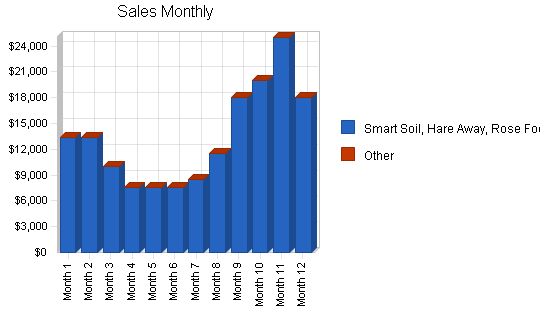
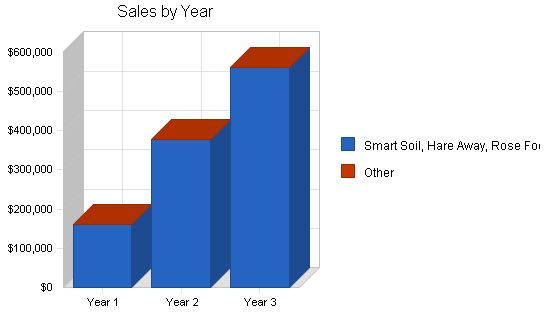
Year 1 Year 2 Year 3
Sales
Smart Soil, Hare Away, Rose Food $160,200 $378,000 $562,500
Other $0 $0 $0
Total Sales $160,200 $378,000 $562,500
Direct Cost of Sales:
Year 1 Year 2 Year 3
Smart Soil, Hare Away, Rose Food $68,748 $137,500 $206,250
Other $0 $0 $0
Subtotal Direct Cost of Sales $68,748 $137,500 $206,250
Development Status
Acquisition of Supplies:
Hair Recycling Technologies will start its pilot program by establishing business partner relationships with owners of hair establishments in the Midwest. These relationships will involve placing hair collection bins in salons, which will be picked up every two weeks. HRT will use a leased van to receive the hair. Potting soil and peat moss will be acquired for the prototype. After two weeks, HRT will retrieve the bins and begin the next phase of processing.
Prototype of Product:
Hair Recycling Technologies will process human hair by using a conventional microwave oven to sanitize it. The hair will then be chopped into smaller strands using a rotary cutter. HRT will combine and package substantial portions of the hair, potting soil, and peat moss to create SMART SOIL, the company’s premier product, at a cost of less than 50 cents per bag.
Geographical Location:
The company facility is currently an 18′ x 30′ room located in the basement of one of the founders in the South Bend area. The maximum capacity of this facility is 250,000 units of the SMART SOIL product. Capacity projections for the next three years are as follows:
– 2001: ~125,000 units/year
– 2002: [Two people processing] ~250,000 units/year
– 2003: [Three people processing] ~375,000 units/year
Facilities and Improvements:
The company plans to stay in its current South Bend location through the first quarter of 2003. HRT plans to be fully established in a new South Bend facility by the beginning of the second quarter of 2003. In this facility, the company will implement new processing equipment and procedures, including the Gemco V-shape Tumble Blending Microwave Dryer to sanitize and toss the hair, and the Munson M-1 Mini Rotary Cutter to chop the hair into finer strands for better packaging and consumer appeal.
Costs:
Supplies for Products:
– Potting Soil: $0.03/pound
– Peat Moss: $0.07/pound
– Cottonseed Meal: $0.01/pound
– Hair: $0.03/pound
– Bags (each): $0.03
– Labels (each): $0.03
Total: $0.23
General Administrative Expenses:
– PBX system with voice mail service:
– Three phone lines ($60/month) $180
– One 800 line ($20/month) $20
Advertising costs will be approximately 15% of gross sales.
Management Summary:
K. Justin Luber is the mind behind Hair Recycling Technologies. He saw the need for hair to be recycled and used in several environmentally beneficial ways. With the development, determination, motivation, and persistence of everyone involved, HRT will be the leading producer of recycled hair in the future.
The management team of Hair Recycling Technologies includes:
– President of Operations: K. Justin Luber
– Vice-President of Operations/Finance: Jason Mysliwec
– Financial Advisor: Hunter Korth
– Marketing Advisor: Robin Liu
At Hair Recycling Technologies, the management team believes that this unique way of recycling will change the way consumers look at gardening. The responsibilities and duties of the management team are important and cannot be taken lightly. They will work together as a team to create a successful company.
Organizational Structure:
The responsibilities involved in the company are great and abundant. HRT’s main purpose is to appeal to environmentally conscious gardeners by developing products that include recycled hair. Each executive member will have several responsibilities imperative to fulfill the duties in producing unique gardening products.
K. Justin Luber, as founder and president of HRT, will oversee the entire operation. He will be in charge of public relations, hiring and firing employees, and making decisions concerning the well-being of the company.
Jason Mysliwec, as vice-president of finance/operations, will be responsible for HRT’s financial operations and developing funding for the company.
The marketing department, led by Mr. Luber, will create the need for SMART SOIL and the animal deterrent, monitor competition, and analyze market research to appeal to customers’ needs.
The sales department, also led by Mr. Luber, will be responsible for advertising and promotion, setting sales quotas, and developing a sales force.
Research and development, led by Mr. Mysliwec, will focus on creating new ideas for using recycled hair in the gardening industry and diversifying the product line.
Mr. Mysliwec will also promote teamwork, handle conflicts, motivate employees, and manage the production line.
Management Team:
K. Justin Luber, President of Operations:
Mr. Luber is a second-year MBA candidate with concentrations in marketing and strategy. He has leadership abilities and experience in sales and marketing. He will play a key role in the success of HRT.
Jason Mylisiwec, Vice-President of Finance/Operations:
Mr. Mylisiwec has a Bachelor of Science degree in business administration and an MBA with a finance concentration. He has experience in financial operations and will ensure efficient resource allocation.
Hunter Korth, Financial Advisor:
Mr. Korth has experience in finance and investment planning. He will provide financial advice and help secure funding for the company.
Robin Liu, Director/Advisor of Marketing:
Mr. Liu has experience in sales and marketing and will be responsible for creating market demand for HRT’s products. He will work closely with Mr. Luber on product development and distribution.
Personnel Plan:
Year 1 Year 2 Year 3
Office Manager $19,800 $40,788 $63,018
Justin Luber $15,000 $24,000 $30,000
Jason Mysliwec $15,000 $24,000 $30,000
Hunter Korth $15,000 $24,000 $30,000
Robin Liu $15,000 $24,000 $30,000
Total People 5 6 7
Total Payroll $79,800 $136,788 $183,018
Hello!
I’m Andrew Brooks, a seasoned finance consultant from the USA and the mind behind phonenumber247.com.
My career is built on a foundation of helping individuals and businesses thrive financially in an ever-changing economic landscape. At phonenumber247.com, my aim is to demystify the complex world of finance, providing clear, actionable advice that can help you navigate your financial journey with confidence. Whether it’s personal finance management, investment strategies, or understanding the nuances of market dynamics, I’m here to share insights and tools that can propel you towards your financial goals.
Welcome to my digital space, where every piece of advice is a step closer to financial clarity and success!
